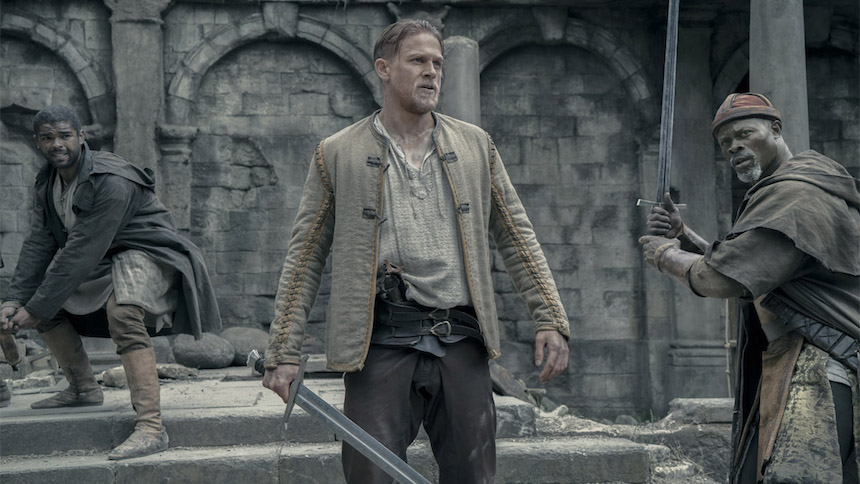Review: Guy Ritchie's KING ARTHUR: LEGEND OF THE SWORD, Very, Very Familiar
Charlie Hunnam and Jude Law star in director Guy Ritchie's familiar attempt to modernize a legendary tale.

There are countless films about the legend of King Arthur, from a Disney animation (The Sword in the Stone) to a hilarious satire (Monty Python and the Holy Grail) to a romance with Richard Gere (First Knight) to the epic that pretty much covers all the important happenings of the tale (Excalibur). King Arthur: Legend of the Sword, the newest version, is focused on the struggle of Arthur (Charlie Hunnam) to accept his destiny once he manages to pull out the sword from the stone and becomes the biggest threat to England's illegitimate king, the evil Vortigern (Jude Law).
Unlike other film adaptations, King Arthur: Legend of the Sword gives a mayor weight to the protagonist's process to control the power of the sword that, as you know, makes him the legitimate king. There's an emphasis on the crucial moment from the past when Arthur went from being the son of King Uther (Eric Bana) to just another plebeian, raised in a brothel.
Eventually, the boy who became a man far away from royalty will bring hope to the regular folk under the growing tyranny of Vortigern (Jude Law). He's a one-dimensional antagonist that, in his own quest to become the most powerful being, ended peace between the humans and the magicians, and almost erased the latter group from the map.
With this notion, multiple screenwriters established a scenario that features no complications for the development of a conventional adventure movie about the battle between good and evil. What to do, though, in order to inject some personality and inventiveness to yet another film about King Arthur? The solution, at least in the minds of Warner Bros. Pictures executives, was to hire director Guy Ritchie, who in the late nineties was known as the "British Quentin Tarantino."
Ritchie is the cornerstone in the attempt to "modernize" the films of King Arthur. This is something that is quite clear once a montage arrives, in which the editing flows rapidly - with energetic background music - and allows seeing Arthur's growth and, at the same time, Vortigern as the new king. However, this is not surprising at all given that Ritchie has been using the same style since his first two feature length films, Lock, Stock and Two Smoking Barrels and Snatch.
It is fair to say that the best moments of King Arthur: Legend of the Sword come from some montages with Ritchie's trademark, particularly when the director plays with the narrative for a comic effect. Hunnam also helps with his charisma, as the movie focuses on Arthur's longtime friends and his father's old allies. Without becoming characters as memorable as the ones from Snatch, they star in the most decent scenes, both funny and dramatic.
The rest is a predictable and forgettable fantasy that, in the end, doesn't adds much neither to the genre nor to the evolution of its director. That is perfectly exemplified with a sequence in which Arthur takes care of some of his enemies in slow-motion; nothing that we haven't seen before in movies like 300 or even in Ritchie's very own Sherlock Holmes.







